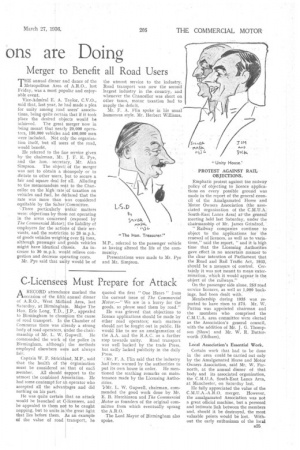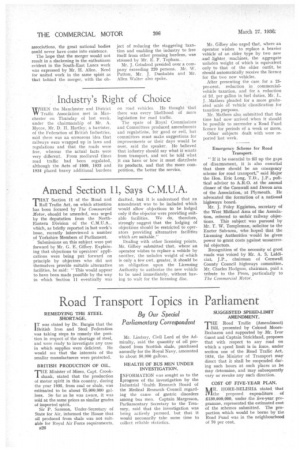Merger to Benefit all Road Users
Page 39

Page 40

If you've noticed an error in this article please click here to report it so we can fix it.
THE annual dinner and dance of the Metropolitan Area of A.R.O., last Friday, was a most popular and enjoyable event.
Vice-Admiral E. A. Taylor, C.V.O., said that, last year, he had made a plea for unity among road users' associations, being quite certain that if it took place the desired objects would be achieved. The great merger now in being meant that nearly 20,000 operators, 150,000 vehicles and 400,000 men were included. Not only the organization itself, but all users of the road, would benefit.
He referred to the fine service given by the chairman, Mr. J. F. E. Pye, and the hon. , secretary, Mr. Alan
Simpson. The object of the merger was not to obtain a onopoly or to dictate to other users, ut to secure a fair and square deal fo all. Alluding to the memorandum se t to the Chancellor on the high rate of taxation on vehicles and fuel, he d dared that the rate was more than vas considered equitable by the Salter Committee. "Three particularly unfair matters were: objections by the not operating in the areas concerne (exposed by The Commercial Motor) the liability of employers for the actio s of their servants, and the restricti n to 20 m.p.h. of goods vehicles weighi g over 2-i tons, although passenger and goods vehicles might have identical c ssis. An increase to 30 m.p.h. wo Id relieve congestion and decrease op rating costs. Mr. Pye said that un ty would be of
the utmost service to the 'industry. Road transport was now the second largest industry in the. country, and whenever the Chancellor was short on other taxes, motor taxation had to supply the deficit. .
Mr. F. A. Flirt spoke in his usual humorous style. Mr. Herbert Williams, M.P., referred to the passenger vehicle as having altered the life of the community.
Presentations were made to Mr. Pye and Mr. Simpson. PROTEST AGAINST RAIL OBJECTIONS.
Emphatic protest against the railway policy of objecting to licence applications on every possible ground was made in the report of the general council of the Amalgamated Horse and Motor Owners. Association (the associated Organization of the C.M.U_A:. South-East Lanes Area) at' the general meeting held last Saturday, under the chairmanship of Mr. James Grindrod.
"Railway companies continue • to object to the applications for the renewal of licences, as well as to variations," said the report, " and it is high time that the Licensing Authorities gave. effect in no uncertain manner t6 the clear intention of Parliament that the Road and Rail Traffic Act, 19:33, should be a measure of control. Certainly it was not meant to mean extermination, which it .would appear is the object of the railways."
On the passenger side alone, 253 road service licences, as well as 1,090 back
ings, . ings, had been dealt with. .
Membership during 1935 was reported to have risen to 573. Mr. W. Patton was appointed chairman and the members who comprised the C.M.U.A. area committee were elected as the Association's general council, with the addition of Mr. J. G. Thompson (Shaw) and Mr. W. R. Butterworth (Oldham).
Local Association's Essential Work.
Certain work that had to be done in the area could be carried out only by the Amalgamated Horse and Motor Owners Association, said Mr. W. Farnorth, at the annual dinner of that body and its associated organization, the C.M.U.A. South-East Lance Area, at Manchester, on Saturday last.
He fully appreciated the value of the C.M.U.A.-A.R.O. merger. However, the amalgamated Association was not a great official machine, but a personal and intimate link between the members and, should it be destroyed, the most valuable points would be lost. Without the early enthusiasm of the local associations, the great national bodies could never have come into existence.
The hope that the merger would not result in a slackening in the enthusiasm evident in the South-East Lanes work was expressed by Mr. H. Allen. Need for united work in the same spirit as that behind the merger, with the ob ject of reducing the staggering taxation and enabling the industry to free itself from other pressing burdens, was stressed by Mr. E. F. Topham.
Mr. J. Grindrod presided over a company exceeding 220 persons. Mr. W. Patton, Mr. J. Dunbabin and Mr. Allen Walter also spoke.
Mr. Gilbey also urged that, where an operator wishes to replace a heavier vehicle of an older type by two new and lighter machines, the aggregate unladen weight of which is equivalent only to that of the older outfit, he should automatically receive the licence for the two new vehicles.
After presenting the case for a 25per-cent. reduction in commercialvehicle taxation, and for a reduction of 2d. per gallon in fuel duties, Mr. L. J. Mathers pleaded for a more graduated scale of vehicle classification for taxation purposes.
Mr. Ma-tilers also submitted that the time had now arrived when it should be possible to surrender a' Road Fund licence for periods of a week or more.
Other subjects dealt with were reported last week.
Emergency Scheme for Road Transport.
"If it be essential to fill up the gaps of disarmament, it is also essential that there should be an emergency scheme for road transport," said Major the Hon. Eric Long, T.D., J.P., political adviser to A.R.O. at the annual dinner of the Cornwall and Devon area of the Association, at Plymouth. He advocated the formation of a national highways board.
Mr. J. Foley Egginton, secretary of the West Midland Area of the Association. referred to unfair railway objections. This subject was pursued by Mr. T. W. Templeman, solicitor to the Exeter Sub-area, who hoped that the Licensing Authorities would be given power to grant costs against unsuccessful objectors.
Recognition of the necessity of good roads was voiced by Mr. A. S. Liddiciat, j.P., chairman of Cornwall County Council highways committee. Mr. Charles Hodgson, chairman, paid a tribute to the Press, particularly to The Commercial Motor.




























































































